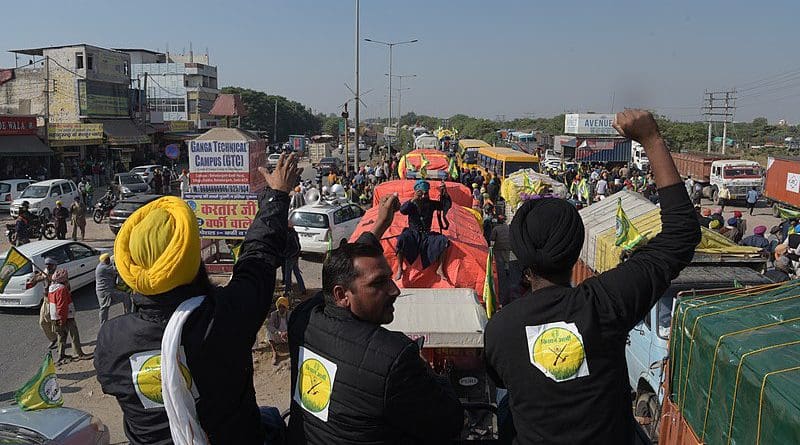India’s Farmers Hit The Streets Over Rushed Reform Bills
By riding their tractors into the capital New Delhi on India’s Republic Day (26 January) India’s farmers declared opposition to new laws designed to boost agricultural exports through corporate players but feared to go against the interests of millions of smallholders.
“We are not opposed to reforms if they are genuine,” says Harpal Sandhu a burly, turbaned farmer who rode in from Punjab state, known as India’s granary for its bumper wheat and rice harvests. “The government has a hidden agenda to support big money — look at the way they rushed the bills through Parliament in record time without consulting farmers or other stakeholders.”
The business-friendly government of Prime Minister Narendra Modi first announced its new farming plans in 2018. Encouraged by the landslide victory gained by the ruling Bharatiya Janata Party the following year, the government moved into legislation mode. But the three farm bills were rushed through Parliament in September 2020 without adequate consultation and appeared to favour big business over farmers’ interests.
“The bills promote contract farming and prohibit farmers from approaching the courts or other authority for redressal of complaints against corporates,” says Sandhu.
Camped on Delhi’s outskirts for two months in the bitter chill of a north Indian winter, the farmers moved into the city on 25 January and symbolically ‘captured’ the mediaeval Red Fort, the symbol of authority since the reign of the Mughal emperor Shah Jahan in the 17th century. Scores were hurt as farmers clashed with the police.
Meanwhile, the bills have been stayed by the Supreme Court which set up a special committee to look into the farmers’ objections. Separately, the government has announced that it would keep the bills in abeyance for 18 months. “We have given them [farmers] a good offer. Let them discuss it and get back to us in that time,” India’s minister for agriculture, Narendar Singh Tomar told reporters over the weekend.
Farming in India needs reforms which is painfully visible in the average of 10,000 odd suicides among farmers over the past two decades and the mounds of surplus grain that lie rotting for want of storage and processing facilities. But, farmers fear that the new laws may worsen the situation for them.
Kavitha Kuruganti, convenor of Alliance for Sustainable and Holistic Agriculture, an umbrella body for over 400 farming organisations, says the farmers are against centralised, top-down reforms. “Reforms,” she says, “should take into consideration the economic and cultural diversity of farming across India and address such issues as social equity and sustainability.”
In 2003, the central government had legislated to regulate the sale of important farm commodities such as wheat and rice under a set minimum support price. But this worked for some states and not for others. The new bills are aimed at removing such regulations and the distortions they created. Removing controls are also seen to attract investment in badly needed infrastructure such as cold storage and food processing. Modi’s stated aim is to foster a ‘one nation, one market’ scenario for India.
While similar policies have worked in smaller countries, it’s difficult to implement in India because of its vastness and diverse market conditions. Crops, agro-climatic zones, socio-economic conditions and administrations change across the borders of 28 states and eight territories. The national government should let the elected governments in each state decide what is best based on needs and situations. And without a minimum set price, farmers will be thrown to the mercy of big corporations for sure.
*This piece was produced by SciDev.Net’s Asia & Pacific desk.

